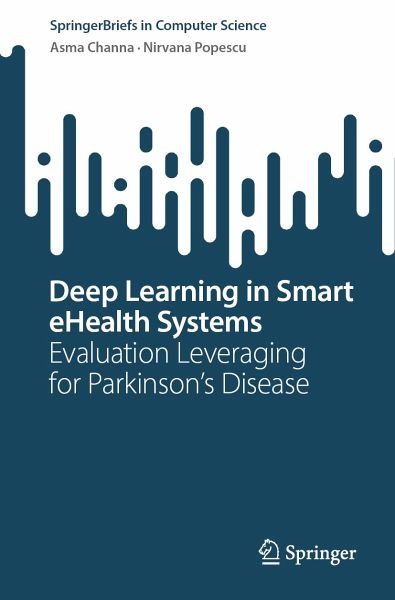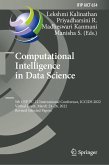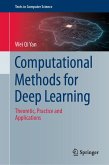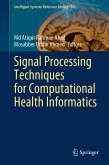Asma Channa, Nirvana Popescu
Deep Learning in Smart eHealth Systems (eBook, PDF)
Evaluation Leveraging for Parkinson's Disease
36,95 €
36,95 €
inkl. MwSt.
Sofort per Download lieferbar

18 °P sammeln
36,95 €
Als Download kaufen

36,95 €
inkl. MwSt.
Sofort per Download lieferbar

18 °P sammeln
Jetzt verschenken
Alle Infos zum eBook verschenken
36,95 €
inkl. MwSt.
Sofort per Download lieferbar
Alle Infos zum eBook verschenken

18 °P sammeln
Asma Channa, Nirvana Popescu
Deep Learning in Smart eHealth Systems (eBook, PDF)
Evaluation Leveraging for Parkinson's Disease
- Format: PDF
- Merkliste
- Auf die Merkliste
- Bewerten Bewerten
- Teilen
- Produkt teilen
- Produkterinnerung
- Produkterinnerung

Bitte loggen Sie sich zunächst in Ihr Kundenkonto ein oder registrieren Sie sich bei
bücher.de, um das eBook-Abo tolino select nutzen zu können.
Hier können Sie sich einloggen
Hier können Sie sich einloggen
Sie sind bereits eingeloggt. Klicken Sie auf 2. tolino select Abo, um fortzufahren.

Bitte loggen Sie sich zunächst in Ihr Kundenkonto ein oder registrieren Sie sich bei bücher.de, um das eBook-Abo tolino select nutzen zu können.
- Geräte: PC
- ohne Kopierschutz
- eBook Hilfe
- Größe: 3.33MB
Andere Kunden interessierten sich auch für
![Computational Intelligence in Data Science (eBook, PDF) Computational Intelligence in Data Science (eBook, PDF)]() Computational Intelligence in Data Science (eBook, PDF)40,95 €
Computational Intelligence in Data Science (eBook, PDF)40,95 €![Elements of Dimensionality Reduction and Manifold Learning (eBook, PDF) Elements of Dimensionality Reduction and Manifold Learning (eBook, PDF)]() Benyamin GhojoghElements of Dimensionality Reduction and Manifold Learning (eBook, PDF)53,95 €
Benyamin GhojoghElements of Dimensionality Reduction and Manifold Learning (eBook, PDF)53,95 €![Intelligent Systems and Networks (eBook, PDF) Intelligent Systems and Networks (eBook, PDF)]() Intelligent Systems and Networks (eBook, PDF)129,95 €
Intelligent Systems and Networks (eBook, PDF)129,95 €![Urban Intelligence and Applications (eBook, PDF) Urban Intelligence and Applications (eBook, PDF)]() Urban Intelligence and Applications (eBook, PDF)161,95 €
Urban Intelligence and Applications (eBook, PDF)161,95 €![Computational Methods for Deep Learning (eBook, PDF) Computational Methods for Deep Learning (eBook, PDF)]() Wei Qi YanComputational Methods for Deep Learning (eBook, PDF)48,95 €
Wei Qi YanComputational Methods for Deep Learning (eBook, PDF)48,95 €![Signal Processing Techniques for Computational Health Informatics (eBook, PDF) Signal Processing Techniques for Computational Health Informatics (eBook, PDF)]() Signal Processing Techniques for Computational Health Informatics (eBook, PDF)113,95 €
Signal Processing Techniques for Computational Health Informatics (eBook, PDF)113,95 €![Guide to Convolutional Neural Networks (eBook, PDF) Guide to Convolutional Neural Networks (eBook, PDF)]() Hamed Habibi AghdamGuide to Convolutional Neural Networks (eBook, PDF)40,95 €
Hamed Habibi AghdamGuide to Convolutional Neural Networks (eBook, PDF)40,95 €-
-
-
Produktdetails
- Verlag: Springer International Publishing
- Seitenzahl: 94
- Erscheinungstermin: 5. November 2023
- Englisch
- ISBN-13: 9783031450037
- Artikelnr.: 69320372
Dieser Download kann aus rechtlichen Gründen nur mit Rechnungsadresse in A, B, BG, CY, CZ, D, DK, EW, E, FIN, F, GR, HR, H, IRL, I, LT, L, LR, M, NL, PL, P, R, S, SLO, SK ausgeliefert werden.
- Herstellerkennzeichnung Die Herstellerinformationen sind derzeit nicht verfügbar.
Asma Channa has recently achieved a Double Ph.D. in Computers and Information Technology. She obtained her Master's degree in Electronic Systems Engineering from Mehran University of Engineering and Technology, Jamshoro, Pakistan in 2018, and her Bachelor's degree in Electronics from the same institution in 2015. Her academic pursuits have culminated in a dual doctoral endeavor pursued at the University Politehnica of Bucharest, Romania, and Mediterranea University of Reggio Calabria, Italy. Distinguished as a Marie Sklodowska-Curie Fellow in the prestigious European project A-WEAR, Dr. Channa has made substantial contributions to the fields of wearable technology, eHealth, biomedical signal processing, and artificial intelligence. Her achievements underscore a profound dedication to interdisciplinary research, manifesting her commitment to advancing the frontiers of knowledge at the crossroads of technology and healthcare. With her foundation rooted in extensive academic accomplishments, she remains steadfast in pushing the boundaries of innovation and delivering impactful contributions to the field.
Nirvana Popescu is full professor at University POLITEHNICA of Bucharest (UPB), Computer Science Department, since 2014. She received her Bachelor of Engineering in 1998 at UPB, Computer Science Department, followed by M.Sc at the same department. In 2003, she received her PhD in Computer Science with a thesis titled "Self-organizing intelligent fuzzy systems", at UPB. Meanwhile she worked and studied as PhD guest student at the University of Bielefeld, Germany. Her main research interests are neural networks, intelligent systems, fuzzy logic and control, eHealth systems, cognitive and autonomous robots, reconfigurable computers. At UPB, she is the leader of the Laboratory for "Reconfigurable high-confidence medical devices" and she coordinated research projects in the field of Medical Rehabilitation Robotics and Medical Wearable Sensors.
Nirvana Popescu is full professor at University POLITEHNICA of Bucharest (UPB), Computer Science Department, since 2014. She received her Bachelor of Engineering in 1998 at UPB, Computer Science Department, followed by M.Sc at the same department. In 2003, she received her PhD in Computer Science with a thesis titled "Self-organizing intelligent fuzzy systems", at UPB. Meanwhile she worked and studied as PhD guest student at the University of Bielefeld, Germany. Her main research interests are neural networks, intelligent systems, fuzzy logic and control, eHealth systems, cognitive and autonomous robots, reconfigurable computers. At UPB, she is the leader of the Laboratory for "Reconfigurable high-confidence medical devices" and she coordinated research projects in the field of Medical Rehabilitation Robotics and Medical Wearable Sensors.
Unraveling Parkinson's Disease: Diagnostic Challenges and Severity Assessment.- State-of-the-Art: Wearable Devices and Deep Learning Techniques for Parkinson's Disease.- Design and Engineering of a Medical Wearable Device for Parkinson's Disease Management.- Deep Learning Models for Parkinson's Disease Severity Evaluation.- Transforming Parkinson's Disease Care: Cloud Service Empowered by ServiceNow Technology.- Predicting Wearing-Off Episodes in Parkinson's with Multimodal Machine Learning.- Enhancing Gait Analysis Through Wearable Insoles and Deep Learning Techniques.- Conclusion and Prospects for Further Development.
Unraveling Parkinson's Disease: Diagnostic Challenges and Severity Assessment.- State-of-the-Art: Wearable Devices and Deep Learning Techniques for Parkinson's Disease.- Design and Engineering of a Medical Wearable Device for Parkinson's Disease Management.- Deep Learning Models for Parkinson's Disease Severity Evaluation.- Transforming Parkinson's Disease Care: Cloud Service Empowered by ServiceNow Technology.- Predicting Wearing-Off Episodes in Parkinson's with Multimodal Machine Learning.- Enhancing Gait Analysis Through Wearable Insoles and Deep Learning Techniques.- Conclusion and Prospects for Further Development.







